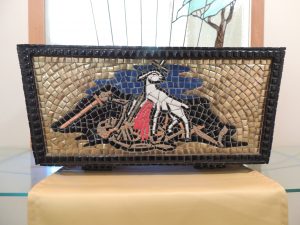HOMILY OCTAVE of EASTER – SATURDAY
The Good News of Easter
(Acts 4:13-21; Ps 118; Mk 16:9-15)
*********************************************
As we approach the end of the Octave of Easter and all its solemnities, the readings today provide an encapsulating chronology for us to ponder.
In the Gospel, Mary Magdalene becomes the first witness to the resurrection of Jesus. It is understandable Jesus would appear to her first, as she had experienced his unconditional love as forgiveness and healing the most (she had been delivered from seven demons). Interestingly, the reaction on the part of the apostles, presumably including Peter and John, was stubborn disbelief. They also refused to believe the disciples to whom Jesus had appeared on the road to Emmaus. Jesus then appears to them and scolds them for their lack of faith and stubbornness. Then he commanded them to go out to the whole world and spread the good news.
In the first reading, Peter and John were totally different. They had been filled with the Spirit of the Risen Jesus at Pentecost, and now, they could not refrain from speaking about what they witnessed and praised God for all that was happening, in spite of experiencing the same stubborn disbelief as the apostles from the Jewish leaders.
The psalm picks up on the invitation for us to praise the Lord for answering our prayer, and to give thanksgiving and exaltation for God’s fidelity
All of this invites us to become, like the apostles, recognized as “companions of Jesus.” We are called to witness to the resurrection like Peter, John and Mary Magdalene, and to proclaim the Good News to all of creation.
That raises the question: what exactly is this “good news” that we are to proclaim to all of creation?
The first part of the Good News would have to be to witness to the reality that Jesus is risen from the dead to a new and eternal life. He would never die again, for the first time in the history of humanity. We can rejoice that sin and death has been overcome.
 The tabernacle made by Fr. Al Hubenig OMI, is a unique expression of this faith. A lamb holding a victory standard with blood pouring out of his chest stands over a skeleton that is waving a sword. The obvious meaning is that the Lamb has conquered the evil one, the skeleton. The sword symbolizes the harm and violence the evil one is still inflicting on the world, as he does not know that he is already defeated. In other words, the war is already won, but the last battle is still going on.
The tabernacle made by Fr. Al Hubenig OMI, is a unique expression of this faith. A lamb holding a victory standard with blood pouring out of his chest stands over a skeleton that is waving a sword. The obvious meaning is that the Lamb has conquered the evil one, the skeleton. The sword symbolizes the harm and violence the evil one is still inflicting on the world, as he does not know that he is already defeated. In other words, the war is already won, but the last battle is still going on.
A second part of the Good News to proclaim is that through Jesus, we are forgiven and redeemed of all our sins. All we have to do now is to repent and receive that forgiveness to be reconciled with the Church, the Body of Christ. The scriptures, both in the Old Testament and the New Testament, state that “as far as the East is from the West God will put our sins,” and God won’t even remember them! They no longer exist.
A third element of the Good News is we can also be healed of our painful emotions, defects of character and addictions like Mary Magdalene. Jesus came not just to redeem and forgive, but also to sanctify and make whole. We can also claim the peace and joy of the Holy Spirit Jesus imparted to his disciples. And above all, we can also recognize him in the breaking of the Bread, as we are doing right now.
So, let us place our complete and total faith in Jesus as Risen Lord, give praise and glory to our God how God is working in our lives, and then witness to others all these dimensions of the Good News.



